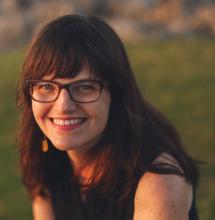Deb Raftus, an Associate Librarian at UW Libraries, serves as department librarian and liaison between UW Libraries and the Department of Spanish & Portuguese Studies. She describes her role as “serv[ing] as a point of contact to a department, to send updates about library services and news, to provide research and teaching help, to purchase library materials, and to keep abreast of departmental needs.” In an interview over email, it becomes readily apparent that this only begins to cover the breadth of Raftus’s duties, and the depth of the resources at her disposal in her work assisting faculty, graduate and undergraduate students in their research.
Before joining UW Libraries in 2007, Raftus earned a BA in French from the University of Vermont and an MA in French from Middlebury College, but it was during her time between those two programs, as a Reference Assistant at Cornell University Library, where she really wanted to become a librarian, providing in-person and online research help: “I really enjoy helping people with their research, I love the daily learning that comes with the job, and the variety of activities.”
Working at a library provided her with insight into their value, Raftus reflected, “I didn't learn about what a library can offer until I started working in one after college”. Raftus specifically wanted to work as a Romance Languages librarian eventually, “I therefore pursued the MA in French before continuing on to get my MLIS (Master of Library and Information Science) degree.” Earning her MLIS at the UW Information School, Raftus worked simultaneously at Odegaard Undergraduate Library while in the program.
As the librarian for Spanish & Portuguese Studies, Raftus assists SPS in several ways, from course support and research assistance to collection development. One way she helps SPS courses directly is by assisting students in developing their research techniques: “I teach research workshops quarterly, visiting classes including SPAN 303 and 316 and PORT 301. Workshops are designed in partnership with faculty to support students in conducting research for the particular assignments in that class.” Supporting courses has been a recent challenge due to the pandemic. Course materials that would normally be available in person have had to be reconsidered due to the closure of the physical library: “Course reserves for books and films have been tricky. It's a service a lot of students use for necessary cost savings, and we cannot fully duplicate it electronically, even though we want to. For course reserve requests this year, we've tried to purchase or license electronic copies.” One way to work around these difficulties is the utilization or creation of open educational resources (OERs). “We have been helping instructors find open sources to use as course materials or in developing their own to use and share publicly.”
Collection development is connected with one of Raftus’s current projects and involves coordination between herself, Eduardo Viana da Silva, Associate Teaching Professor and Portuguese Program Coordinator in Spanish & Portuguese Studies, and another librarian, Renan Leite. “I'm currently sponsoring a Capstone project with a librarian from Brazil and current UW iSchool MLIS student, Renan Leite.” This project is funded by a grant from UW Libraries, a Kenneth S. and Faye G. Allen Opportunity Award, which provided funding to develop a new collection of Portuguese language texts. Leite worked with Viana da Silva to discuss relevant themes and authors, and then with vendors to compile a list of books to order. Raftus said, “[w]ith the new Minor in Portuguese Language and Luso-Brazilian Studies, we are working together to fill a gap and meet the growing needs of the program, where students in 300-level courses read literature and conduct research requiring Portuguese-language sources.”
Raftus’s project with Leite and Viana da Silva expanding the library’s Portuguese collection is an extension of one of her most favorite parts of the job: “One of the most exciting parts of the job is traveling to international book fairs to buy books! I am able to do so about every few years. I learn about current scholarship, new and independent publishers, and recent publications. By speaking directly with book professionals, I am able to share with them what the teaching and research focuses are at UW, and they can pull suggestions for me on the spot.”
Other ways Raftus and UW Libraries has helped departments is through workshops and assistance in open-access publishing, data management and visualization, digital humanities, public scholarship, open pedagogy, GIS, podcasting, media production, copyright, and more. “we can help you create an open textbook like Eduardo Viana da Silva's Bate Papo, with data visualization like Ph.D. alumna Katie King's Spanish translation project” said Raftus, noting some recent projects by SPS faculty and students.
But the services and offerings at UW Libraries are not limited to just faculty and graduate students. Raftus noted a number of different services available, including appointments at the Odegaard Writing & Research Center with peer tutors and librarians, an undergraduate research tutorial Canvas course, and consultations with a subject librarian, and the Library Research Award for Undergraduates, a venue where undergraduates can showcase their work.
The library's programs are not limited to only academic matters: “we host events and programs to support student well-being. Some examples include: orientations for transfer students, virtual study rooms during finals, tips on how to find your balance, graduate funding information, and more.” Last but not least, UW Libraries is the largest student employer on campus, with job postings on the UW Libraries' website.
Raftus wants students to know that she and UW Libraries are able to support UW students in a variety of ways. “We're a part of your support network while you're a student here (whether you're an undergrad or grad student), so please don't hesitate to ask for help.”
By Casey Colvin, with contributions by Marilis Mediavilla.
